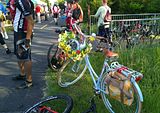Recently, action and protests have taken place to increase awareness of the issues regarding cyclists safety, particularly in London where there has been an increase in commuters who use their bikes to get to work. Great ideas and work can be seen on Ibikelondons blog which is well worth a look and addresses many of the problems that cyclists face on a day to day basis.
As a regular commuter and one who has done so for many years in rural and in city areas, this is a campaign I warmly welcome. Its one I implore any person or cyclist to take note of and show their support for.
The Times newspaper recently found itself involved in the debate for safer cycling when one of its own journalists was hit metres away from work. Mary Bowers was hit by a lorry on the 3rd November and has remained stable but in coma since. Rather than letting her become another tragic statistic the Times have launched their campaign which you can read daily. This has gained much backing from Professional Cyclists like Mark Cavendish Sir Chris Hoy, Bradley Wiggins, Rebbca Romero and Nicole Cooke
The Times has launched a public campaign and 8-point manifesto calling for cities to be made fit for cyclists:
- Trucks entering a city centre should be required by law to fit sensors, audible truck-turning alarms, extra mirrors and safety bars to stop cyclists being thrown under the wheels.
- The 500 most dangerous road junctions must be identified, redesigned or fitted with priority traffic lights for cyclists and Trixi mirrors that allow lorry drivers to see cyclists on their near-side.
- A national audit of cycling to find out how many people cycle in Britain and how cyclists are killed or injured should be held to underpin effective cycle safety.
- Two per cent of the Highways Agency budget should be earmarked for next generation cycle routes, providing £100 million a year towards world-class cycling infrastructure. Each year cities should be graded on the quality of cycling provision.
- The training of cyclists and drivers must improve and cycle safety should become a core part of the driving test.
- 20mph should become the default speed limit in residential areas where there are no cycle lanes.
- Businesses should be invited to sponsor cycleways and cycling super-highways, mirroring the Barclays-backed bicycle hire scheme in London.
- Every city, even those without an elected mayor, should appoint a cycling commissioner to push home reforms.
I would agree that cyclists are also not totally blameless. There are some bad examples of riding, some stupidly aggressive, and those that swing out at cars or cross lights on red, anger me just as much as car drivers who push past. There needs to be some education in there and it needs to be forced onto both cyclists and driver.
What the Times proposes makes sense and I think we should also continue to look to cities like Amsterdam and Coppenhagen for our influences on how to do it right. My only gripe with this kind of comparison is that cycling abroad is much more excepted and in some like Belgium is their national sport. In this country it's still considered a nuisance despite nearly a third of all adults in this country owning one.
If this campaign is of interest to you then please look at this link and pledge your support and you can even attach a nice button to your blog like I've got (if you need help doing this let me know). Its time to make a difference.

























0 Comments:
Post a Comment